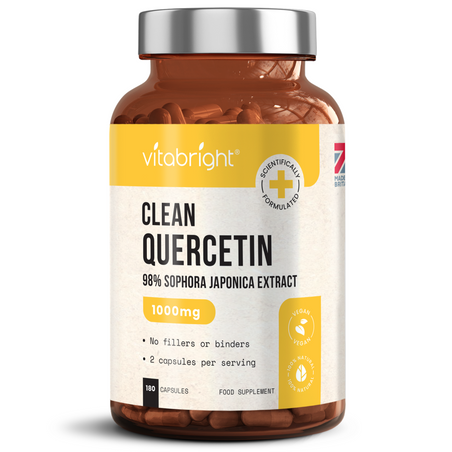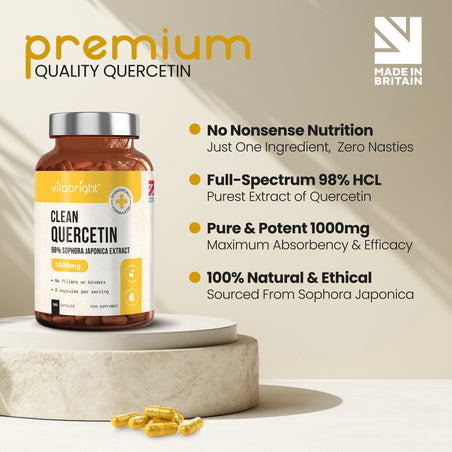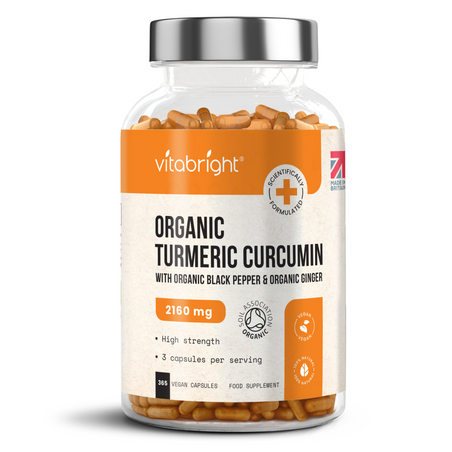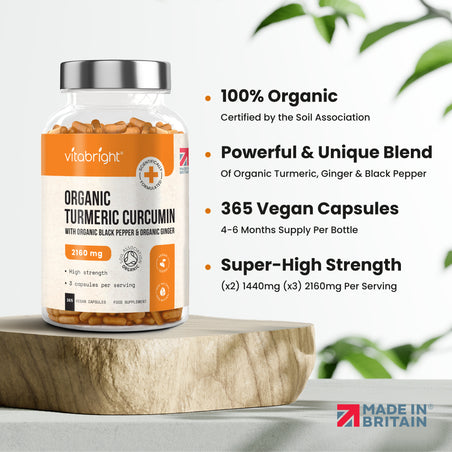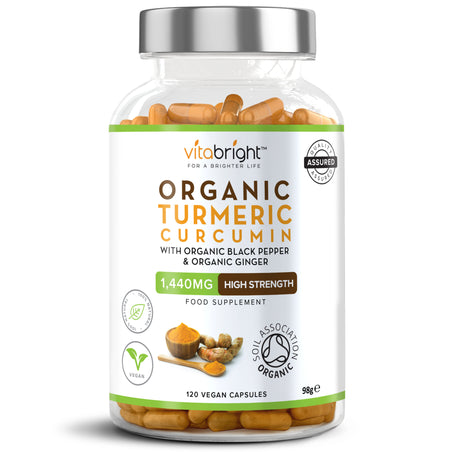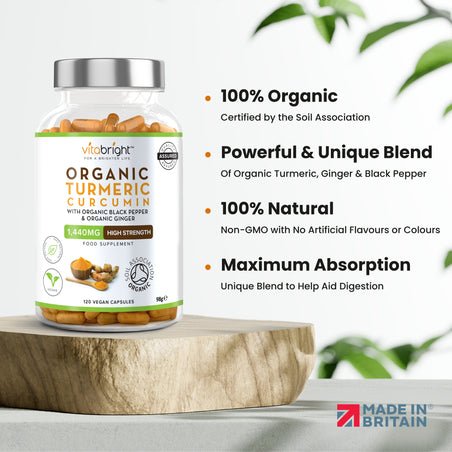Vegan Supplements
This page shows the most popular vegan supplements in our range.
Scroll down for guidance on which vitamins and nutrients are most often lacking in vegan diets.
Organic Turmeric Curcumin 2160mg with Organic Black Pepper & Organi...
Organic Turmeric Curcumin 1440mg with Organic Black Pepper & Organi...

Which Nutrients Might Vegans Need to Supplement?
Vegans may need to pay special attention to certain nutrients that are mainly found in animal-derived foods. Try to make sure you are getting enough through your diet.
Whilst a well-planned vegan diet can provide most of the essential nutrients, there are a few nutrients that you may need to consider supplementing.
1. Vitamin B12
Source: Vitamin B12 is mainly found in meat, making it a nutrient of concern for vegans.
Importance: Vitamin B12 is essential for nerve function, DNA synthesis to repair and heal, and producing red blood cells.
Supplementation: Consider taking a vitamin B12 supplement and eating fortified foods, such as fortified plant milks, cereals, or nutritional yeast.
2. Vitamin D
Source: Vitamin D is mainly obtained through sun exposure, fish and eggs. A very small amount is found in some fortified foods and mushrooms.
Importance: Vitamin D plays a crucial role in calcium absorption, bone health, and immune function.
Supplementation: If you live in the UK, and especially if you work indoors, you may benefit from vitamin D supplementation. Fortified foods and mushrooms can also increase your vitamin D intake.
3. Iron
Source: Iron from plant foods (non-heme iron) is not as well absorbed as iron from animal foods (heme iron).
Importance: Iron is essential for oxygen transport, energy production, and immune function.
Enhancing Absorption: Consuming iron-rich plant foods with vitamin C-rich foods can enhance iron absorption. Good sources of plant-based iron include lentils, beans, tofu, fortified cereals, and leafy green vegetables.
Supplementation: Some vegans, especially women of childbearing age, may benefit from iron supplementation if they have low iron levels or are at risk of iron deficiency.
Vegans may need to pay special attention to certain nutrients that are mainly found in animal-derived foods. Try to make sure you are getting enough through your diet.
Whilst a well-planned vegan diet can provide most of the essential nutrients, there are a few nutrients that you may need to consider supplementing.
1. Vitamin B12
Source: Vitamin B12 is mainly found in meat, making it a nutrient of concern for vegans.
Importance: Vitamin B12 is essential for nerve function, DNA synthesis to repair and heal, and producing red blood cells.
Supplementation: Consider taking a vitamin B12 supplement and eating fortified foods, such as fortified plant milks, cereals, or nutritional yeast.
2. Vitamin D
Source: Vitamin D is mainly obtained through sun exposure, fish and eggs. A very small amount is found in some fortified foods and mushrooms.
Importance: Vitamin D plays a crucial role in calcium absorption, bone health, and immune function.
Supplementation: If you live in the UK, and especially if you work indoors, you may benefit from vitamin D supplementation. Fortified foods and mushrooms can also increase your vitamin D intake.
3. Iron
Source: Iron from plant foods (non-heme iron) is not as well absorbed as iron from animal foods (heme iron).
Importance: Iron is essential for oxygen transport, energy production, and immune function.
Enhancing Absorption: Consuming iron-rich plant foods with vitamin C-rich foods can enhance iron absorption. Good sources of plant-based iron include lentils, beans, tofu, fortified cereals, and leafy green vegetables.
Supplementation: Some vegans, especially women of childbearing age, may benefit from iron supplementation if they have low iron levels or are at risk of iron deficiency.

4. Zinc
Source: Zinc is found in various foods, including meat, dairy, nuts, seeds, and legumes. However, the bioavailability of zinc from plant foods is generally lower than from animal foods due to the presence of phytates, which can inhibit zinc absorption.
Importance: Zinc is essential for immune function, protein synthesis, DNA synthesis, wound healing, and cell division.
Supplementation: You may need to consider zinc supplementation. Good plant-based sources of zinc include pumpkin seeds, chickpeas, lentils, and almonds. Zinc supplements can also be beneficial, especially for vegans with low zinc intake or absorption issues.
5. Vitamin K
Source: Vitamin K is found in two main forms: K1 (phylloquinone) in leafy green vegetables and K2 (menaquinone) in fermented foods and animal products.
Importance: Vitamin K is essential for blood clotting, bone health, and cardiovascular health.
Supplementation: While vitamin K1 can be obtained from leafy green vegetables, vegans may have a lower intake of vitamin K2, as it is primarily found in fermented foods and animal products. Vegans can consider taking a vitamin K2 supplement derived from fermented soybeans (MK-7) to ensure adequate intake of this important nutrient.
6. Multivitamins
Source: A well-planned vegan diet can provide most essential nutrients, but certain nutrients may be challenging to obtain in sufficient amounts solely from plant foods.
Importance: Multivitamins can provide a convenient way to ensure adequate intake of essential vitamins and minerals that may be lacking or insufficient in a vegan diet.
Supplementation: Vegans can consider taking a vegan-friendly multivitamin to help fill potential nutrient gaps and ensure optimal intake of essential vitamins and minerals.
4. Zinc
Source: Zinc is found in various foods, including meat, dairy, nuts, seeds, and legumes. However, the bioavailability of zinc from plant foods is generally lower than from animal foods due to the presence of phytates, which can inhibit zinc absorption.
Importance: Zinc is essential for immune function, protein synthesis, DNA synthesis, wound healing, and cell division.
Supplementation: You may need to consider zinc supplementation. Good plant-based sources of zinc include pumpkin seeds, chickpeas, lentils, and almonds. Zinc supplements can also be beneficial, especially for vegans with low zinc intake or absorption issues.
5. Vitamin K
Source: Vitamin K is found in two main forms: K1 (phylloquinone) in leafy green vegetables and K2 (menaquinone) in fermented foods and animal products.
Importance: Vitamin K is essential for blood clotting, bone health, and cardiovascular health.
Supplementation: While vitamin K1 can be obtained from leafy green vegetables, vegans may have a lower intake of vitamin K2, as it is primarily found in fermented foods and animal products. Vegans can consider taking a vitamin K2 supplement derived from fermented soybeans (MK-7) to ensure adequate intake of this important nutrient.
6. Multivitamins
Source: A well-planned vegan diet can provide most essential nutrients, but certain nutrients may be challenging to obtain in sufficient amounts solely from plant foods.
Importance: Multivitamins can provide a convenient way to ensure adequate intake of essential vitamins and minerals that may be lacking or insufficient in a vegan diet.
Supplementation: Vegans can consider taking a vegan-friendly multivitamin to help fill potential nutrient gaps and ensure optimal intake of essential vitamins and minerals.

You May Also Need...
7. Omega-3 Fatty Acids (EPA and DHA)
Source: Omega-3 fatty acids EPA (eicosapentaenoic acid) and DHA (docosahexaenoic acid) are primarily found in fatty fish and seafood.
Importance: Omega-3 fatty acids are essential for brain health, inflammation regulation, and cardiovascular health.
Supplementation: Vegans can consider taking an algae-based omega-3 supplement to ensure adequate intake of EPA and DHA, as algae are a primary source of these fatty acids in the marine food chain.
8. Calcium
Source: Calcium mostly comes from dairy products, which are not consumed in a vegan diet. It exists at lower levels and in less bioavailable forms, in certain vegetables.
Importance: Calcium is essential for bone health, muscle function, and nerve transmission.
Supplementation: Vegans can obtain calcium from fortified plant milks, fortified orange juice, fortified tofu, almonds, and leafy green vegetables. However, some vegans may still need to consider calcium supplements.
9. Iodine
Source: Iodine is mostly found in seafood and dairy products.
Importance: Iodine is essential for thyroid function and metabolic regulation.
Supplementation: Vegans can get iodine from iodised salt, seaweed, and fortified foods. However, excessive intake of iodine-rich seaweed can lead to excessive iodine intake, so it's essential to eat it in moderation. Some vegans may need to consider iodine supplements if their intake is too low.
7. Omega-3 Fatty Acids (EPA and DHA)
Source: Omega-3 fatty acids EPA (eicosapentaenoic acid) and DHA (docosahexaenoic acid) are primarily found in fatty fish and seafood.
Importance: Omega-3 fatty acids are essential for brain health, inflammation regulation, and cardiovascular health.
Supplementation: Vegans can consider taking an algae-based omega-3 supplement to ensure adequate intake of EPA and DHA, as algae are a primary source of these fatty acids in the marine food chain.
8. Calcium
Source: Calcium mostly comes from dairy products, which are not consumed in a vegan diet. It exists at lower levels and in less bioavailable forms, in certain vegetables.
Importance: Calcium is essential for bone health, muscle function, and nerve transmission.
Supplementation: Vegans can obtain calcium from fortified plant milks, fortified orange juice, fortified tofu, almonds, and leafy green vegetables. However, some vegans may still need to consider calcium supplements.
9. Iodine
Source: Iodine is mostly found in seafood and dairy products.
Importance: Iodine is essential for thyroid function and metabolic regulation.
Supplementation: Vegans can get iodine from iodised salt, seaweed, and fortified foods. However, excessive intake of iodine-rich seaweed can lead to excessive iodine intake, so it's essential to eat it in moderation. Some vegans may need to consider iodine supplements if their intake is too low.








